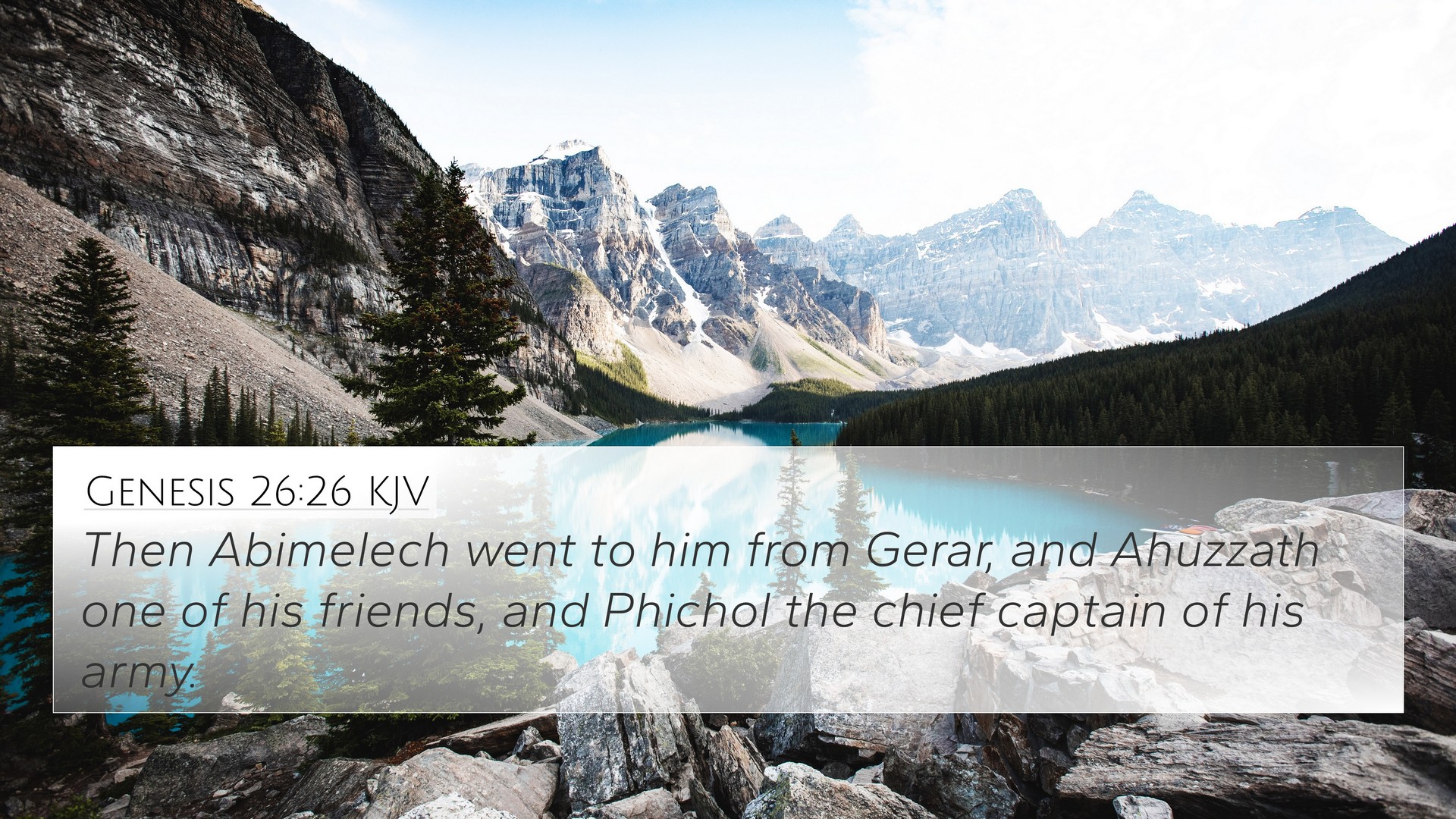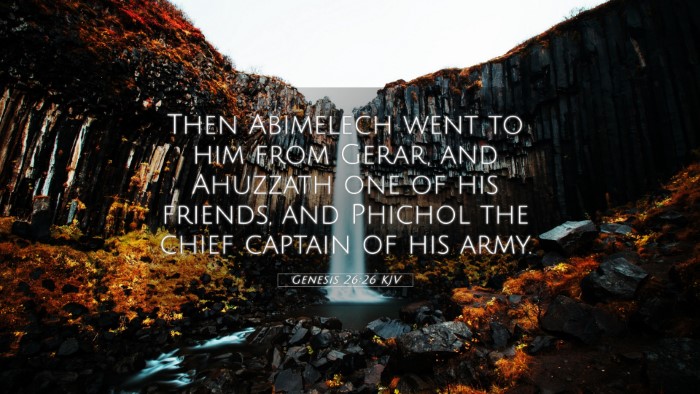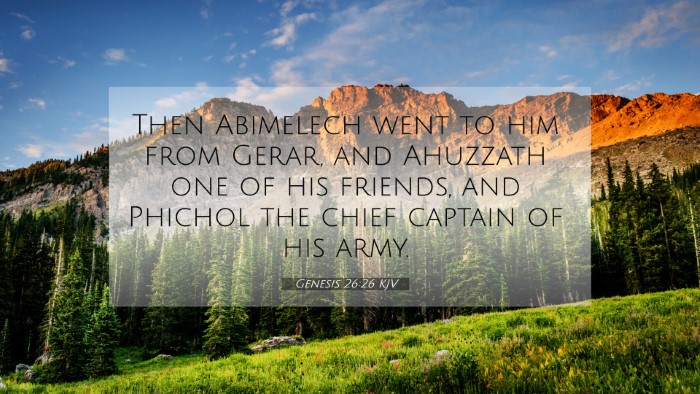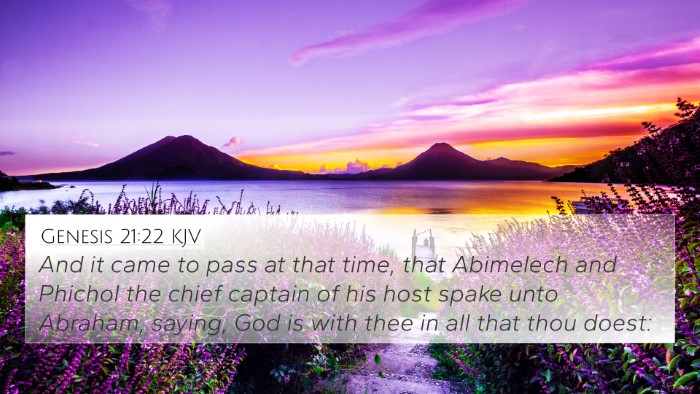Understanding Genesis 26:26
Genesis 26:26 states:
“Then Abimelech went to him from Gerar, with Ahuzzath, one of his friends, and Phicol, the captain of his army.”
This verse introduces a pivotal moment in the interactions between Isaac and Abimelech, King of the Philistines. Below, we will explore the meaning and implications of this scripture based on insights from respected public domain commentaries.
Meaning and Context
The context of Genesis 26 discusses the blessings Isaac experiences in the land of Gerar amidst famine and conflict over water resources. Abimelech, upon hearing of Isaac's prosperity, seeks to forge an alliance with him. This demonstrates a significant theme of reconciliation and the importance of peaceful relations in biblical narratives.
Insights from Public Domain Commentaries
-
Matthew Henry:
Henry emphasizes the resolve of Isaac in the face of strife and the divine favor he receives even when faced with opposition. The visit from Abimelech can be viewed as a recognition of Isaac's increased prominence.
-
Albert Barnes:
Barnes notes that Abimelech’s envoy illustrates the political dynamics of the time. The mention of Phicol, the captain of the army, also underlines the seriousness of the visit, indicating that warfare may have been on the horizon had Jacob not been blessed.
-
Adam Clarke:
Clarke discusses the covenantal nature of the relationship forming between Isaac and Abimelech, suggesting the historical significance of such alliances in the biblical narrative, and reflecting on the earlier covenants made with Abraham.
Bible Verse Cross-References
Genesis 26:26 has several significant cross-references that help illuminate its meaning:
- Genesis 21:22-23: Abimelech’s earlier interaction with Abraham, setting a precedent for the king's dealings with Isaac.
- Genesis 25:11: Showing how God’s blessings on Abraham's family extend to Isaac.
- Genesis 20:1-18: The story illustrates God’s protection over Abraham and continues into Isaac’s narrative.
- Philippians 4:9: An encouragement on following the examples of peace and trust in God’s provision.
- Romans 12:18: The apostolic instruction on living peaceably with all men, relevant to Isaac's demeanor with Abimelech.
- Genesis 26:28-29: The continued interaction illustrates the formation of a mutual pledge of protection and support.
- 1 Peter 3:9: Encouragement to not repay evil for evil serves as a parallel to Isaac’s response to possible aggression.
Connections Between Bible Verses
When analyzing Genesis 26:26, one can identify numerous thematic connections throughout Scripture:
- Covenant and Promises: The relationships formed here depict the continuation of God’s covenant with Abraham’s descendants.
- Peace and Conflict Resolution: The interactions represent how God’s people are called to navigate conflicts with integrity and wisdom.
- Divine Favor: Much like God’s favor toward Abraham, Isaac experiences this in a foreign land, which encourages believers in their current circumstances.
Tools for Bible Cross-Referencing
Utilizing tools for cross-referencing can assist in deeper understanding. Some effective resources include:
- Bible concordance for locating related verses.
- Cross-reference guides that help follow themes and direct connections.
- Online Bible reference resources and applications that enable you to identify parallels rapidly.
Conclusion
The visit of Abimelech to Isaac signifies more than a mere meeting; it illustrates crucial elements of biblical diplomacy, divine blessing, and the importance of reconciliation. Through comparative analysis and cross-referencing, readers gain insight into the broader narrative that unfolds throughout the Scriptures, encouraging believers to explore deeper connections both within the Old and New Testaments.
Please Refer to Further Studies:
- For in-depth study on covenant connections, see related Isaiah passages.
- Explore New Testament teachings that echo the importance of peace among believers (Matthew 5:9).
- Dive into the prophetic literature where God's promises unfold (Jeremiah 31:31-34).




